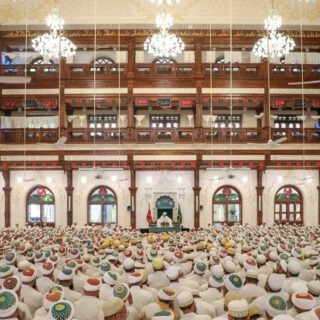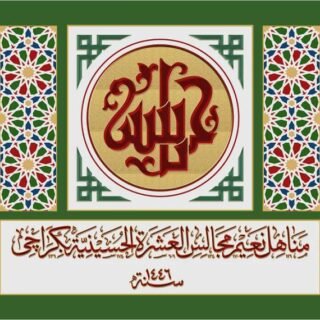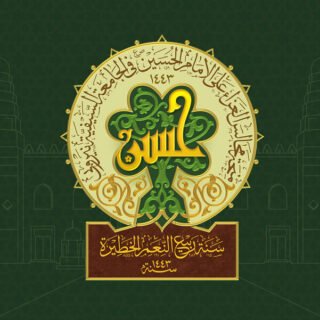Reflections
On the occasion of Maulana al-Imam al-Hasan’s AS shahaadat, the 53rd al-Dai al-Mutlaq, al-Dai al-Ajal al-Fatimi Syedna Aali Qadr Mufaddal Saifuddin TUS, delivered a waʿz mubarak in Dar al-Suroor, Burhanpur, which he graciously instructed to be relayed to Mumineen all across the world. For the first time since the beginning of the global pandemic, Mumineen were blessed with the opportunity to behold Syedna al-Dai al-Ajal TUS and listen to his inspired words as he spoke them seated upon the imāmī takht in the benevolent shade of al-Maula al-Ajal Syedi Abdulqadir Hakimuddin’s QR qubba mubaraka. For this spontaneous and magnanimous blessing, Mumineen throughout the world are forever grateful.
Syedna Aali Qadr Mufaddal Saifuddin TUS revealed that al-Maula al-Ajal Syedi Abdulqadir Hakimuddin QR had written a 138-verse qasida mubaraka extolling the virtues of Amirul Mumineen, Maulana Ali AS. It is known as Qasida Tibriyya, for it transforms the soul of the one who recites it into pure gold, tibr being an Arabic word for gold. In many instances, Syedi Hakimuddin QR expands upon the verses by narrating the historical references which they allude to. In a testament to his literary prowess and evidence of his deep love for Maulana Ali AS, each verse in his composition ends with the name ‘Ali’. Syedna al-Dai al-Ajal TUS recited around 21 verses and narrated eleven historical incidents which speak to the preeminence of Maulana Ali AS.
In one verse, Syedi Hakimuddin QR speaks of a snake that came out of Amirul Mumineen’s AS shoe just as he was about to put it on. Once Maulana Ali AS had removed his shoes to do wudu and a snake slithered into one of them. As he was about to wear it again, a crow came and shook the shoe forcing the snake to come out.
Elsewhere Syedi Hakimuddin QR refers to Amirul Mumineen AS as Amir al-Nahl (the queen bee). Amirul Mumineen AS was once sent to battle at the fort of Bani Shal by Rasul Allah SAW. As the two sides fought, the opposing army ran out of weapons and resorted to unleashing a swarm of bees upon the Muslimeen. Seeing the swarm approaching, fear pervaded the ranks of the army. However, upon seeing Amirul Mumineen AS the bees immediately offered their obeisance to him. From that day forth he was also known as Amir al-Nahl.
In another couplet, Syedi Hakimuddin QR references Amirul Mumineen’s AS miraculous ability to mould metal in his hands as if he was working with wax. Amirul Mumineen AS was once occupied with moulding metal and fashioning it into armour rings. Those who beheld this astounding feat were left speechless. Amirul Mumineen AS reminded them that Dawood Nabi AS, known for his ability to fashion metal with just his hands, was able to do so because Amirul Mumineen AS had graced him with that capability. Why then should the onlookers be astounded?
In another verse Syedi Hakimuddin QR alludes to an occasion when Amirul Mumineen AS came upon a withered tree. ‘With the permission of Allah, sprout leaves and bear fruits’, Amirul Mumineen AS uttered. At that very instant pears began to form, which those present ate and also took back with them.
In one verse, Syedi Hakimuddin QR references the events that led to the revelation of Sura al-Insaan upon Rasul Allah SAW which describes Amirul Mumineen AS as providing food for the poor, the orphaned and the captive. Syedna Mufaddal Saifuddin TUS explained that upon hearing that Imam Hasan AS and Imam Husain AS had taken ill, Rasul Allah SA and two others came to enquire over their health. Of the two who had accompanied Rasul Allah SA, one suggested that Maulana Ali AS take up a vow to carry out a good deed should the Almighty cure them. Immediately, Maulana Ali AS declared that he would fast for three days in gratitude of Allah if they were cured of their illness. Maulatona Fatema AS took up the same vow as did Imam Hasan AS, Imam Husain AS and Fizza, the maidservant. The very moment in which all five took their vows, Imam Hasan AS and Imam Husain AS were cured.
The next day, all five of them began their three days of fasting. However, at that time a famine had gripped the region and not a grain of food was to be found in the house. Maulana Ali AS went to his neighbour, a Jewish man who dealt in wool. He offered him to spin three yarns of wool in return for three sāʿ (a small container, yet also refers to ancient Islamic measurement the precise volume of which varies) of grain to which the merchant agreed. On the first day, Fizza had prepared five rotis for iftar using one sāʿ of grain. Just as Maulana Ali AS was about to take a morsel of the roti with grounded salt, a pauper arrived at the door requesting food. At that very instant, Maulana Ali AS placed the morsel down. Addressing Maulatona Fatema AS in verse, Amirul Mumineen AS described the divine reward found in feeding the poor. Responding to Maulana Ali’s AS poetic request to part with their meal, Maulatona Fatema AS replied in kind with a series of verses in which she welcomed Maulana Ali’s wish and declared that Rasul Allah SA had bestowed her with both benevolence and contentment. Maulana Ali AS gave all the food to the pauper and all five had nothing but water that night.
The second day, in preparation for the end of the fast, Fizza again prepared another five rotis from one of the remaining sāʿs of grain. Just as Amirul Mumineen AS was about to break his fast with the fresh roti, an orphan appeared at the door and asked the Nabi’s family to share their food for he was ravenous with hunger. Once again, Maulana Ali AS put down the roti and through another series of verses, sought Maulatona Fatema’s AS approval to offer their food to the orphan. Although seeing her children go hungry was difficult to bear, Maulatona Fatema AS said that she would choose Allah over them and agreed to give the food away. The Ahlebyat, who had now fasted for two successive days without anything to eat, went to bed only having had water.
On the third day, five rotis were prepared with the final sāʿ of grain. At the door that day came an aseer, or destitute captive. As was his way, Amirul Mumineen AS, in verse, expressed his desire to give the last remaining food to him. He explained how when giving, one must not recount the favour done. Maulatona Fatema AS declared that all that remains are these five rotis, the preparation of which had exhausted her hands. Consenting to give away their only meal, she besought Allah, the Almighty to not forsake her children because of the virtuosity of their father, and pledged to Maulana Ali AS that she would never complain as her blessed head was draped in the chador of contentment.
At midnight, Imams Hasan and Husain AS said that they were unable to sleep due to the intense hunger that had overcome them. Amirul Mumineen AS took them to Nabi Mohammed SA who enquired as to why they had come so late at night. After Amirul Mumineen AS explained the situation and his children’s intense hunger, Rasul Allah SA instructed them to all head back to Maulatona Fatema AS. When they arrived, they found her in the mihrab beseeching the Creator to not let the Prophet’s family die of hunger. At that moment, the angel Jibra’eel descended upon the Nabi SA from the heavens and as a reward for the Ahle Bayt’s virtuosity, declared, ‘Take this!’.
The Prophet asked, ‘What shall I take?’ ‘The Sura of ‘Hal Atā’’ came Jibra’eel’s response.
Syedna Saifuddin TUS then narrated the angelic traits of Syedi Abdul Qadir Hakimuddin QR quoting an excerpt from the bayan mubarak of Syedna Mohammed Burhanuddin RA which states that those who wish to lay eyes upon an angel in this realm, should look to Syedi Hakimuddin QR. Syedna Taher Saifuddin RA wrote a panegyric commemorating Syedi Hakimuddin’s QR exemplary life and conduct. Syedna Mufaddal Saifuddin TUS made special reference to two of Syedi Hakimuddin’s QR innumerable traits mentioned in it. The first was that he was ever present and sincere in the service of his Dai and this in itself is indicative of being in the highest of ranks of khidmat. The second distinction he held was that he always remembered the Dai, thus he too was, in turn, always remembered by the Dai. Renowned for his amanat (trustworthiness) Syedi Hakimuddin QR bequeathed all his belongings to Syedna Ismail Badruddin RA upon his passing so that he may dispense them as he saw fit. Upon learning of this, Syedna Badruddin RA praised him, ‘And who other than you can discharge an amanat, o’ Hakimuddin?’
Seven months into the global pandemic, Syedna Mufaddal Saifuddin TUS reminded Mumineen that they are forever in his heart, always on his mind and consistently in his prayers. Syedna al-Dai al-Ajal TUS prayed for the well-being, safety and protection of Mumineen during these trying times as he did also for all of humanity, ibaad Allah. He passionately pleaded for their happiness; that they be surrounded by their children and loved-ones in mirth and joy, seeing no sorrow apart from the sorrow and grief of Imam Husain AS. Our beloved father, Syedna Saifuddin TUS offered prayers for all those inflicted by this illness that has spread the world; that their health is completely and fully restored. He prayed for those who have succumbed to the illness, bestowing their loved ones with fortitude and ensuring that the deceased receive the intercession of the Panjatan AS, the Imams AS and their Duʿat AS. He reminded us that death for a Mumin is a matter of delight and joy, for it is the portal and passage to heaven. Syedna al-Dai al-Ajal TUS singled out the efforts of doctors who are on the frontlines of this pandemic and prayed for those who have come to the aid of others during these difficult times. Mufaddal Maula TUS prayed for the well-being and safety of all mankind and the swift resolution of the pandemic.
Today as we commemorated the shahadat of Imam Hasan AS the recounting of his martyrdom was also in the words of Syedi Hakimuddin QR. He tells us how, after forty days of poisoning, through dates or water or by other means, the treacherous wife Jaadah sent for a poison that would rend his liver to pieces. Muawiya sent her ‘heera kani’ and one night, the household asleep, she slipped it into his drinking water. The cumulative effect of the weeks of poisoning before meant that Imam Hasan AS was often thirsty and when he asked for water and was given it, one sip left his body seemingly in flames from inside. He collapsed to the floor and called for his son, Maulana Qasim RA to immediately call for Imam Husain AS. “If it seems he will not be able to come immediately then tell him we will meet again at Qiyamat.” Imam Husain AS did reach his dying brother’s side and the two embraced and shared their wrenching sorrow of parting. Imam Hasan AS spoke his final wishes, and called for his son, Maulana Abdullah RA to whom he gave the handwritten note to keep until a time of immense difficulty. It was a note, Syedna TUS told us, that Maulana Abdullah RA never opened, even though he must have faced other difficulties, until the day of Ashura.
Although the world is engulfed in an unprecedented crisis, Mumineen are at peace in the benevolent shade of their Maula, Syedna Mufaddal Saifuddin TUS, by virtue of his prayers and duʿas. True wealth is that which Maula has cultivated in our souls: the love of the Ahle Bayt AS, the Imams AS and the Duʿat AS, and the zikr and remembrance of Imam Husain AS. As we bask in his leadership and love, we pray that Allah Taʿala grant him a long life in pristine health until the Day of Qiyamat.
www.jameasaifiyah.edu








